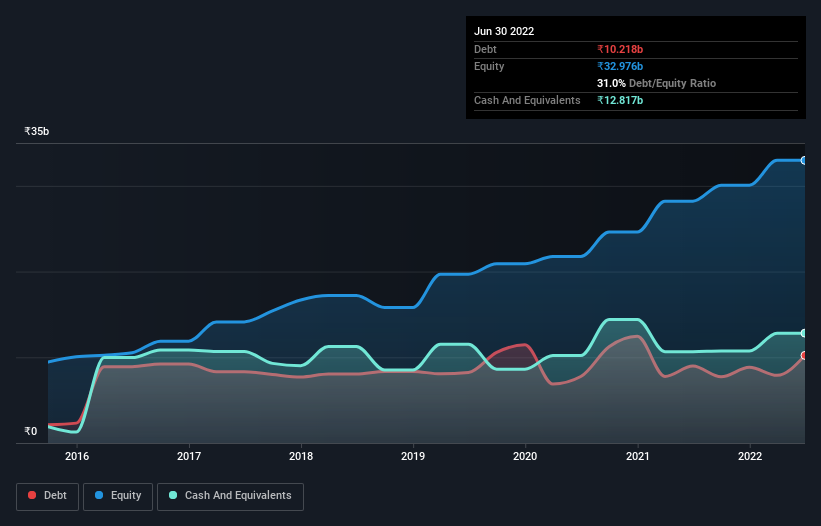
Howard Marks put it nicely when he said that, rather than worrying about share price volatility, 'The possibility of permanent loss is the risk I worry about... and every practical investor I know worries about.' It's only natural to consider a company's balance sheet when you examine how risky it is, since debt is often involved when a business collapses. As with many other companies Syngene International Limited (NSE:SYNGENE) makes use of debt. But is this debt a concern to shareholders?
Why Does Debt Bring Risk?
Debt is a tool to help businesses grow, but if a business is incapable of paying off its lenders, then it exists at their mercy. If things get really bad, the lenders can take control of the business. However, a more common (but still painful) scenario is that it has to raise new equity capital at a low price, thus permanently diluting shareholders. Of course, debt can be an important tool in businesses, particularly capital heavy businesses. The first thing to do when considering how much debt a business uses is to look at its cash and debt together.
Check out our latest analysis for Syngene International
How Much Debt Does Syngene International Carry?
The image below, which you can click on for greater detail, shows that at March 2022 Syngene International had debt of ₹10.2b, up from ₹8.97b in one year. But on the other hand it also has ₹12.8b in cash, leading to a ₹2.60b net cash position.

How Healthy Is Syngene International's Balance Sheet?
We can see from the most recent balance sheet that Syngene International had liabilities of ₹12.3b falling due within a year, and liabilities of ₹10.4b due beyond that. On the other hand, it had cash of ₹12.8b and ₹5.52b worth of receivables due within a year. So it has liabilities totalling ₹4.32b more than its cash and near-term receivables, combined.
Having regard to Syngene International's size, it seems that its liquid assets are well balanced with its total liabilities. So it's very unlikely that the ₹238.7b company is short on cash, but still worth keeping an eye on the balance sheet. Despite its noteworthy liabilities, Syngene International boasts net cash, so it's fair to say it does not have a heavy debt load!
And we also note warmly that Syngene International grew its EBIT by 12% last year, making its debt load easier to handle. When analysing debt levels, the balance sheet is the obvious place to start. But ultimately the future profitability of the business will decide if Syngene International can strengthen its balance sheet over time. So if you're focused on the future you can check out this free report showing analyst profit forecasts.
Finally, while the tax-man may adore accounting profits, lenders only accept cold hard cash. Syngene International may have net cash on the balance sheet, but it is still interesting to look at how well the business converts its earnings before interest and tax (EBIT) to free cash flow, because that will influence both its need for, and its capacity to manage debt. Looking at the most recent three years, Syngene International recorded free cash flow of 34% of its EBIT, which is weaker than we'd expect. That's not great, when it comes to paying down debt.
Summing Up
We could understand if investors are concerned about Syngene International's liabilities, but we can be reassured by the fact it has has net cash of ₹2.60b. And it also grew its EBIT by 12% over the last year. So we don't have any problem with Syngene International's use of debt. When analysing debt levels, the balance sheet is the obvious place to start. However, not all investment risk resides within the balance sheet - far from it. We've identified 1 warning sign with Syngene International , and understanding them should be part of your investment process.
Of course, if you're the type of investor who prefers buying stocks without the burden of debt, then don't hesitate to discover our exclusive list of net cash growth stocks, today.
If you're looking to trade Syngene International, open an account with the lowest-cost platform trusted by professionals, Interactive Brokers.
With clients in over 200 countries and territories, and access to 160 markets, IBKR lets you trade stocks, options, futures, forex, bonds and funds from a single integrated account.
Enjoy no hidden fees, no account minimums, and FX conversion rates as low as 0.03%, far better than what most brokers offer.
Sponsored ContentNew: Manage All Your Stock Portfolios in One Place
We've created the ultimate portfolio companion for stock investors, and it's free.
• Connect an unlimited number of Portfolios and see your total in one currency
• Be alerted to new Warning Signs or Risks via email or mobile
• Track the Fair Value of your stocks
Have feedback on this article? Concerned about the content? Get in touch with us directly. Alternatively, email editorial-team (at) simplywallst.com.
This article by Simply Wall St is general in nature. We provide commentary based on historical data and analyst forecasts only using an unbiased methodology and our articles are not intended to be financial advice. It does not constitute a recommendation to buy or sell any stock, and does not take account of your objectives, or your financial situation. We aim to bring you long-term focused analysis driven by fundamental data. Note that our analysis may not factor in the latest price-sensitive company announcements or qualitative material. Simply Wall St has no position in any stocks mentioned.
About NSEI:SYNGENE
Syngene International
A contract research and manufacturing company, provides drug discovery and development services in India, the United States of America, Europe, and internationally.
Flawless balance sheet with reasonable growth potential.


